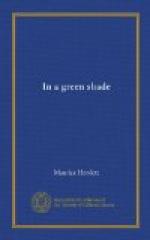POLYOLBION
How precisely does the Englishman love England? I remember saying some years ago that he was not patriotic in the ordinary sense, because though he loved the land, he had very little feeling for the political entity called England—whereas both will be loved by the true patriot. On recent consideration of the matter I am beginning to ask whether he does, after all, love the land itself, as the Irishman loves his, the Scot his, the Switzer his, and the Greek his. I must say that I doubt it. There is this, I think, to be noted of fervent patriots, that the object of their devotion will have had a distressful story. That is the case with the four nations just remarked upon. It has been the case with France ever since France was the passion of the French.
Every man loves his home, for reasons not necessarily connected with the country which happens to hold it; every one of our soldiers of late longed to get back, by no means necessarily because he wanted to see England again. Did he really want to see it at all—I mean for its own sake apart from what it held of his? I know that he would have cut his tongue out sooner than have confessed it. That is his nature, and I can’t help liking him for it—because it is a part of himself, and I like him better than any man in the world. But allowing for that queer shyness, how are we to test his love of our country? Is there a sure test? Well, I know of one, which to my mind is a certainty. Judged by that I must own that Atkins does not stand as a lover should, or would.
My test is this. The lover of his countryside knows its physical features by heart, and to him they have personality. You will have observed the tendency of Londoners to guide you by the names of public-houses; you will have noticed their blank ignorance of points of the compass. To a great extent these defects characterise the Home Counties, and one might try to excuse them in various ways. In the North of England, and in Scotland throughout, you will be told to “go east,” or “keep west” (as the Wordsworths were asked, were they “stepping westward?"), with a conviction that the direction will be sufficient for you as it plainly is for your guide. Now nobody can be said to know his countryside who does not know the airts; and the plain truth is that the Southern Englishman does not know his countryside at all. How, then, can he love it? But there’s a stronger point than that.




